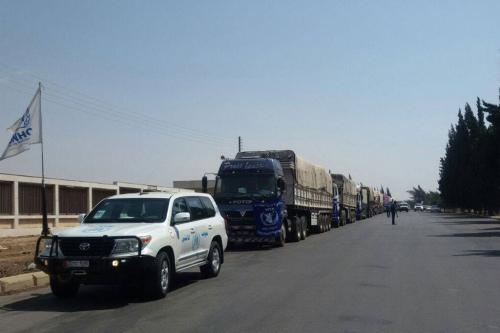Aid convoys ‘ready’ to enter Aleppo; UN envoys await Russia-US talks on truce
Reporting that the Russian Federation is backing a 48-hour humanitarian pause in and around Aleppo, senior United Nations envoys on the Syrian crisis said they are “waiting for others on the ground to do the same,” and are ready to green light aid convoys to the war-ravaged city once assurances are received on Aug 25.

Food, nutrition, health and emergency items enter the Al Waer neighbourhood of Homs, Syria, on 23 August 2016.
“We are ready, trucks are ready and they can leave anytime we get that message,” UN Special Envoy for Syria Staffan de Mistura told reporters in Geneva, where negotiations on humanitarian aid delivery and a cessation of hostilities are under way.
The taskforces for these two subjects, created by the International Syria Support Group (ISSG), have been meeting separately since early this year on a way forward on the crisis. Russia and the United States are the co-chairs of ISSG, which comprises the UN, the Arab League, the European Union and 16 other countries.
In a press stakeout, Mr. de Mistura explained that Russia has already pledged support for the 48-hour pause, and humanitarian convoys are waiting for all the others to “do the same.’
The UN envoy, who has been mediating the intra-Syrian talks, did not comment on the political front, saying that US Secretary of State John Kerry and Russian Foreign Minister Sergey Lavrov are expected to meet in Geneva on Aug 25– a meeting that he said will certainly have an impact on the course of ISSG discussions.
“Our focus, at least when we talk about humanitarian access, should be the people, not political posturing by one side or the other, but the people, that is what is guiding us and what will help, of course, anything that happens regarding also the political process,” he said.
Also speaking at the stakeout was UN Senior Advisor, Jan Egeland, who outlined the Aleppo emergency response plan’s three elements: first, sending two convoys of 20 trucks each that would carry enough food for 80,000 people in eastern Aleppo via the Castello Road, the safest and most direct route.
The second plank is to have simultaneous distributions to western Aleppo, cross-line mostly from Damascus, he said.
The third, he went on, is to use the 48-hour pause to repair the electricity plant in the southern part of Aleppo that serves 1.8 million people and even more importantly, power the pumping of water in the eastern and western parts of the city.
“We have also agreement now from the Russian Federation of the 48 hour pause; we are also waiting it from the other actors on the ground. That has taken more time frankly, than I thought was needed, I thought everybody would help us make it happen,” Mr. Egeland said, but he was hopeful that humanitarian convoys “can roll” shortly to help the long-suffering people in Aleppo.
Turning to other places in Syria, Mr. Egeland said it has been 116 days since aid last reached Madaya, Zabadani, Foah and Kafraya, the besieged areas under the ‘Four Towns Agreement.’
“The one glimmer of hope” was that at long last there was an evacuation in the recent week of 40 children and others of great medical needs in Madaya, Fouah and Kafraya.
He urged those behind the Four Towns Agreement, including Iran and Ahrar al-Sham, help get aid to these four areas where “starvation is just around the corner.”
He said the only place reached this month via land routes was al-Waer, which is getting its second convoy of the month today. Regarding Deir ez-Zor and Qamishli, these places were reached via air drops and air bridges, respectively.
“But we failed the other besieged areas of Syria and it is heartbreaking really when we have all of the supplies ready,” said Mr. Egeland.
The UN estimates that five years on, the conflict has driven 4.8 million refugees to neighbouring countries, hundreds of thousands in Europe, and displaced 6.6 million people inside the Syria against a pre-war population of over 20 million. Well over 200,000 people are believed to have died.
Soruce: United Nations
- 299 reads
Human Rights
Ringing FOWPAL’s Peace Bell for the World:Nobel Peace Prize Laureates’ Visions and Actions

Protecting the World’s Cultural Diversity for a Sustainable Future

The Peace Bell Resonates at the 27th Eurasian Economic Summit

Declaration of World Day of the Power of Hope Endorsed by People in 158 Nations

Puppet Show I International Friendship Day 2020

